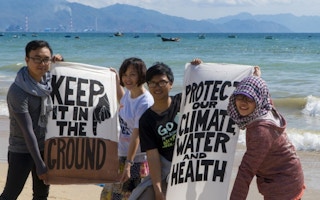One of the world’s largest finance groups, HSBC, has pulled out of a major coal project in Vietnam, marking the latest move by an international bank to go cold on funding the biggest source of climate-changing greenhouse gas emissions.
To continue reading, subscribe to Eco‑Business.
There's something for everyone. We offer a range of subscription plans.
- Access our stories and receive our Insights Weekly newsletter with the free EB Member plan.
- Unlock unlimited access to our content and archive with EB Circle.
- Publish your content with EB Premium.
HSBC was appointed financial advisor to the US$2 billion, 1,980-megawatt Vinh Tan 3 coal-fired power station in southeastern Vietnam in 2014, but the bank declared this week that it is not involved in the project.
Vinh Tan 3 is a planned part of a huge coal power complex in the Vinh Tan, Bình Thuan province of Vietnam, which is projected to produce 12 billion kilowatt-hours of electricity annually, and generate 11 million tonnes of carbon dioxide a year.
The news emerged via a response from the bank to an opinion editorial headlined “HSBC lags as finance cleans up on Asian energy”, written for Asia Times by Munira Chowdhury, an analyst for Australia-based finance pressure group Market Forces, and published on Wednesday.
“
If it wants to avoid more reputational damage, HSBC should at a minimum rule out any investments that help enable the expansion of the fossil fuel industry.
Julien Vincent, executive director, Market Forces
The story was updated, with the footnote from Asia Times stating that HSBC had told the publication that it has “no involvement at all in the Vinh Tan 3 project – including as financial adviser, funding arranger or prospective lender.”
In the article, Chowdhury pointed to data showing that HSBC had pumped US$7.9 billion into coal development between January 2017 and September 2019, and was lagging other international rivals in its efforts to decarbonise its lending portfolio.
Standard Chartered Bank, a major British rival of HSBC’s with a significant presence in Asia, announced in December that it had quit funding deals for a number of coal plants in Southeast Asia, which Eco-Business understands to be Vinh Tan 3, as well as Vung Ang 2 in Vietnam and Java 9 and 10 in Indonesia.
StanChart’s announcement came six months after all three of Singapore’s and Southeast Asia’s largest banks said they would end funding for new coal development.
A climate policy HSBC published in 2018 permits the bank to continue to fund new coal development in developing countries such as Vietnam, Indonesia and Bangladesh.
Julien Vincent, executive director for Market Forces, commented: “It says a lot about how unpopular polluting coal is becoming when even HSBC, which cynically excluded Vietnam, Indonesia and Bangladesh from their no new coal power policy, can’t get a deal like this over the line.
“HSBC has a lot of catching up to do with its climate-friendly lending policies. If it wants to avoid more reputational damage, HSBC should at a minimum rule out any investments that help enable the expansion of the fossil fuel industry,” he said.
Vincent added that, beyond coal power stations, projects like the Payra coal import terminal in Bangladesh “should be off the table for HSBC.”
Researchers from Harvard University project that by 2030, air pollution from coal plants could result in 19,220 premature deaths per year in Vietnam, which is one of the world’s biggest investors in new coal development.










